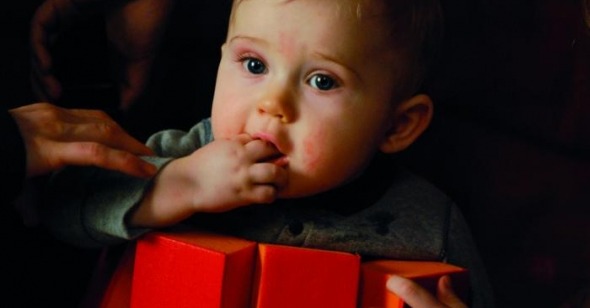Flight of Fancy
by Michael Koresky
Ricky
Dir. François Ozon, France, IFC Films
Ricky, the latest film by François Ozon to receive release in the United States, is so chock full of tonal and generic shifts that it makes for a handy little guide to its French director’s scattershot career. Opening with a punishing long-take close-up of young mother Katie (Alexandra Lamy) crying to an off-screen police officer that she and her child have been abandoned by her husband, the film is introduced as domestic melodrama, not unexpected territory for the once upstart Ozon (as seen in his 5x2, Under the Sand). Soon, through many temporal elisions, we’re watching Katie living alone with her now seven-year-old daughter, Lisa (Mélusine Mayance), who feels unwanted and ignored; then meeting a new lover, Paco (Sergi Lopez, finally not playing the heavy after “Pan’s Labyrinth” and “With a Friend Like Harry . . .”), on the floor of her factory job and banging him in a work bathroom stall (shades of sex farce take us into more Water Drops on Burning Rocks and Sitcom territory). And in the seeming blink of an eye she invites Paco to move in with her and Lisa, soon after which Katie is pregnant with her second child, Ricky.
Thus far Ozon has already transitioned out of the working-class desperation the film initially presents and has attained a lighter tone, a story of redemptive romance, perhaps. Yet Paco’s ambiguous and erratic behavior and male-pattern subsumed anger soon disrupt the idyll. Brown-purplish welts appear on Ricky’s back, below his shoulder blades; seeking a rational explanation, Katie assumes Paco is physically abusing the infant (one might recall Ozon’s breakthrough See the Sea, queasily) and casts him out of the house. Ozon has rushed through all this preliminary material dexterously yet head-spinningly, and his pacing is such that when Ricky starts to act mysteriously, appearing on the tops of high cabinets, and his back bruises begin to sprout talons, we may feel like we’ve already seen about four different movies.
Whether Ricky is a miracle or a mere aberration (angel or freak, one might more crassly put it) is beside the point. As in many of Ozon’s films, the question has more to do with how the “normal” world reacts to such abnormality, and more specifically, how Ricky’s family copes with the unassailable facts of his being. Hence the realistic rather than fairy-tale approach to this magical material makes a lot of sense, aesthetically. The suburban housing complex where Katie and Lisa lives is a mundane, grimy place, yet not objectified as such; the details of their daily routines (Lisa waking up her mother and making her breakfast; the family casually checking their lottery numbers in front of the television) are as crucial to the fabric of the film as Ricky’s special talents. The easier route for this fanciful story would have been to more overtly sugarcoat it, through brighter music, candy-colored cinematography, snappy editing, et cetera; instead Ozon leaves Ricky firmly situated in a shabby here and now.
Though the end of the film focuses on Katie’s emotional regeneration following a seemingly shattering loss (and Lamy is consistently good at rolling with this plot’s strange ebbs and flows), the final protagonist of the film might actually be young Lisa, played by Mayance with disarming naturalism. After all, Lisa, in her desperate feelings of neglect (her mother leaves her alone at night when going on her first date with Paco; later her room is transformed into the nursery), might be the one who conjured Ricky’s mutant form—in an early scene she stares obsessively at the young baby from the dinner table while chomping on a chicken wing.
Ricky is metaphorically sound (talk about empty nest syndrome), but occasionally it’s more than a little clunky: during Ricky’s awkward flights, the poor kid just hangs in his invisible harness and strings—there’s no motion or elegance to his movements. Still, once the film’s central high concept becomes clear, Ozon keeps things swift and sweet, never prolonging his tale’s whimsy or overplaying its dark underbelly. Ozon has always been interested in redefining family, whether through naughty provocation (the domestic bedlam of Sitcom; the twisted take on Hansel and Gretel in Criminal Lovers) or subtler subversion (the backwards anti-marriage drama “5x2”; the consideration of gay parenthood in the labored Time to Leave). Ricky continues this tradition with its off-kilter view of the needs and compromises of family, even if its ultimate message, though layered with a touching ambiguity, is nearly Spielbergian in its themes of hopeful reconciliation.
